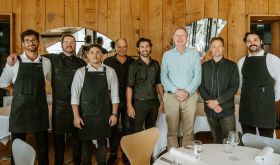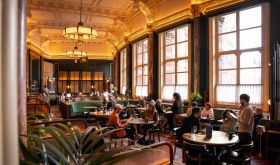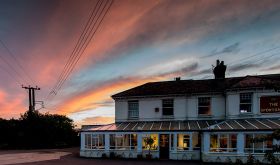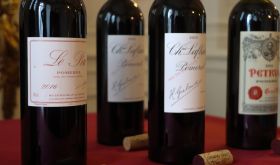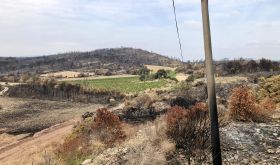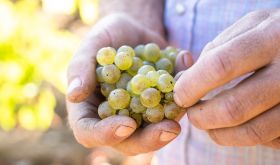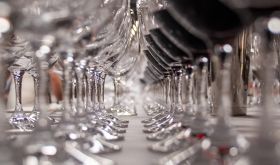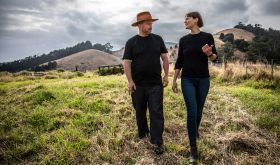Nick writes The unusual inclusion of a food-based article as a Throwback Thursday can be justified on several counts.
The first is that this 15-year-old article is very relevant today. The sight in British specialist food shops at the moment of the first of the season’s green asparagus; the thicker white spears of Spargel from Germany; thick, dark-green pods of Italian broad beans; as well as punnets of bright red, Candonga strawberries from Basilicata in southern Italy, recalled my day in Borough Market back in 2007.
It also made me aware of the effects of climate change. My original article would have been written on or about 20 April 2007, a full four weeks later than this phenomenon today. This is scary.
The final reason for this article’s republication is the reference to Giorgio Locatelli. Today, this highly respected chef is the face of Italy’s Masterchef TV programme. Forty years ago, as a commis chef, he faced the task of preparing 25 boxes of French beans a day in the kitchens of The Savoy – a prospect that almost forced him to quit!
One other observation, of the restaurants cited at the end of my article below, only Anchor and Hope is still in business,
5 May 2007 A version of this article was also published in the Financial Times.
This week marks a significant turning point in how many northern hemisphere chefs manage their kitchens, and simultaneously presents a particular opportunity for anyone who thinks that menu prices are too high or that kitchen brigades do not work hard enough.
What links these two apparently disparate themes is the emergence of the most delicious spring vegetables: asparagus; new potatoes (Jersey Royals in Britain, Noirmoutiers in France); morel mushrooms from Turkey; peas, cipollini onions and broad beans from Italy to be followed quite soon, due to the warmest April on record, by their English counterparts.
But delicious as these ingredients are they also provide any busy kitchen with a particular challenge: how can they organise themselves to peel, pod, scrub and prepare the vast numbers of boxes of each of these ingredients that they are sure to require? The quantities involved in any busy kitchen are enormous. Giorgio Locatelli, the charismatic chef/proprietor of Locanda Locatelli, recently told me that when he first arrived as a young chef in the Savoy in the 1980s his first job involved preparing 25 boxes of French beans a day. A chore, he said, which almost ended his culinary career immediately.
To discover how Jeremy Lee, the ebullient chef at the Blueprint Café by Tower Bridge, organises his kitchen to cope with his particular penchant for all things fresh and seasonal I readily accepted his suggestion to meet him at his fruit and vegetable supplier L Booth’s stall in Borough Market, London SE1.
This well established family company is run by Tony Booth, whose gentle, weatherbeaten face belies his 70 years, a fact he attributes to his intake of fruit and vegetables five times a day. Booth is, in Lee’s opinion, ‘a fount of all vegetable knowledge’ and a supplier to whose stall most quality-conscious buyers gravitate sooner or later.
As we approached at 9am Booth was laying out the largest of the four types of English asparagus he had on offer that day, which came from Cornwall and was as thick as my thumb. This had arrived with a letter from the grower, Jax Buse, asking Booth to send three boxes to Rules restaurant in Covent Garden because it had been grown close to St Enodoc’s Church, a favourite of the late Poet Laureate, Sir John Betjeman, after whom the restaurant had named one of its private rooms.
Next to this were the first Extra Selected and Jumbo asparagus grown by T J A Sore in Suffolk, which really took Lee’s fancy. 'This has everything you look for in asparagus. It is bright, seven to eight inches long and straight as a dye. And we wouldn’t need to peel this, just snap the last inch off the bottom.' Alongside this was some shorter asparagus from the Wye Valley that had begun life under polythene in response to the supermarkets’ demand for a longer growing season as well as the much thinner asparagus known as sprue or sparrow grass from Oxfordshire, which Lee bought and would serve, coated briefly in olive oil and Parmesan and then roasted in the oven, with veal.
It must have been the image of this dish which caused Lee to continue in a more philosophical vein. 'If you look at many of the cooking styles in the rest of Europe they tend to prepare their meat quite simply incorporating just salt, pepper and olive oil which means that they can put all their time and effort into the vegetables. In the UK too much time and effort goes into preparing the meat and the vegetables are humdrum. This has to change.'
Nothing, as far as Lee is concerned, could or should give greater pleasure than a bowl of steaming Jersey Royal potatoes. While Booth initially showed us a couple of bags from Jersey’s central marketing board, he also had several bags from Rabet’s on Beaulieu Farm in the Val de la Mare near St Peter in Jersey, still grown by the traditional method of adding seaweed on to the ground to maintain the earth’s temperature and therefore stimulate growth. 'The real Jersey Royals are now much cheaper than they were earlier in the season,' Booth explained to Lee’s obvious delight, 'because the heavy rains in February meant that they couldn’t plant as early as normal.'
Lee then went on to buy boxes of Italian broad beans and peas which, sautéed with asparagus, artichokes and the last of the fennel, would constitute ‘una fritteda’, a Sicilian first course for which the broad beans do not need to be peeled. To offset this he bought one of Booth’s last boxes of salsify, a vegetable which, because it has to be rigorously scraped and prepared in acidulated water even before being cooked, is uniformly hated, Lee confessed, by his brigade.
Finally, Lee looked almost lovingly at the boxes of Turkish morels which, he explained, would have to have a fine brush carefully put over them to extract the dirt from every spore as they cannot be put into water before cooking. But even though with butter, cream, white wine and garlic these were in Lee’s words 'made to accompany chicken', at £34 per kilo they are currently too expensive for his menu. Without them, this particular vegetable bill came to £134.10
Over a cappuccino in Monmouth Coffee opposite, Lee explained that the vegetable-related workload which now faced him and his kitchen was ‘a dividend that was worth all the effort'. After years of handling kilos of this wonderful produce, Lee has come to several diverse conclusions. Firstly, that the fresher the produce is, the easier it is to handle, because in the older or tougher vegetables more starch has developed and this needs to be broken down by a longer cooking process. Like meat, he explained, undercooked vegetables are as depressing as overcooked ones.
And that while those peeling and preparing vegetables in his kitchen were always busy, this was the time of the year when his respect for the kitchen porters and ‘prep’ chefs he employs reaches new heights. 'They may well scream "not another bloody box" as more broad beans and peas arrive but their devotion to the cause is exemplary. We all tend to work together to get this kind of work done because we appreciate that it marks a definitive change for the coming months in how we are cooking. It is a great deal of labour but when it’s all finished what’s ready for us is a huge range of bright, fresh, young and new-tasting ingredients that don’t take too long to cook. Once the peeling and the podding are over you can sit down and shout hallelujah and know that the stodge of winter is finally behind us.'
Blueprint Café, 28 Shad Thames, Butlers Wharf, London SE1, 020 7378 7031
Kitchen porters and their peelers are also busy at:
The Ambassador, 55 Exmouth Market, EC1, 020-7837 0009.
Paternoster Chop House, Paternoster Square, EC4, 020-7029 9400,
Racine, 239 Brompton Road, SW3, 020-7584 4477,
Ransome’s Dock, 35 Parkgate Road, SW11, 020-7223 1611
and the recently-opened Great Queen Street, 32 Great Queen Street, WC2, 020-7242 0622, a second restaurant from the team behind The Anchor & Hope but which here accepts reservations.



